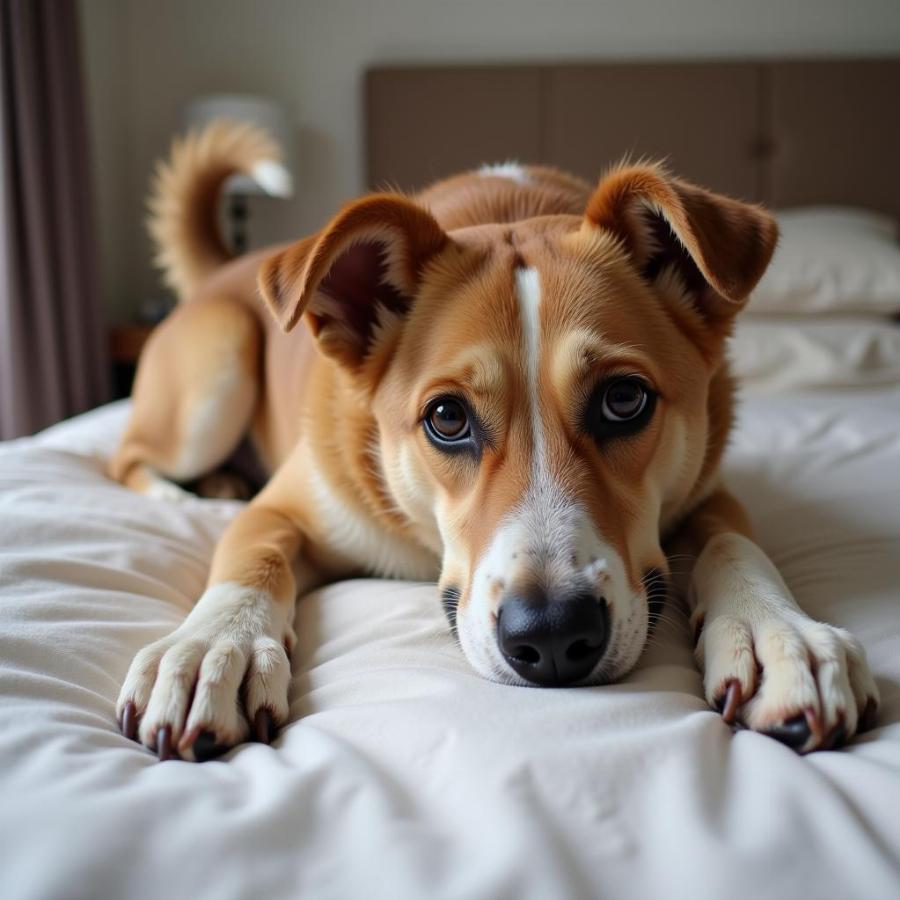Discovering your furry friend has chosen your bed as their personal bathroom can be frustrating and disheartening. However, before you despair, it’s important to remember that punishing your dog won’t solve the problem. Dogs urinate inappropriately for various reasons, and understanding the root cause is crucial to effectively addressing the issue and preventing future accidents. This comprehensive guide will delve into the common causes of why dogs pee on beds and equip you with practical solutions to restore peace and harmony to your household.
Why Does My Dog Pee on the Bed? Decoding Canine Behavior
While it might seem like your dog is deliberately targeting your bed, it’s crucial to understand they’re not acting out of spite. Dogs communicate differently than humans, and inappropriate urination is often a sign of an underlying issue. Let’s explore some common culprits:
Medical Reasons: When Nature Calls, It’s Not Always a Choice
Several medical conditions can lead to inappropriate urination, including:
- Urinary Tract Infections (UTIs): These infections can cause discomfort and an increased urge to urinate.
- Bladder Stones: Stones in the bladder can irritate the lining, leading to incontinence.
- Kidney Disease: Impaired kidney function can affect bladder control.
- Diabetes: Increased thirst and urination are common symptoms.
- Hormonal Imbalances: Conditions like Cushing’s disease can cause incontinence.
If you suspect a medical issue, consult your veterinarian for a proper diagnosis and treatment plan.
Behavioral Triggers: Decoding the Emotional Language of Your Dog
Beyond medical reasons, various behavioral factors can contribute to a dog peeing on the bed:
- Anxiety: Separation anxiety, fear, or stress can trigger inappropriate urination.
- Submissive Urination: Some dogs urinate submissively when they feel anxious or threatened.
- Marking Territory: While less common in neutered dogs, some may still mark their territory, especially in multi-dog households.
- Incomplete Housetraining: Puppies or dogs that haven’t been fully housetrained may have accidents, especially if their bladder control isn’t fully developed.
 Dog Feeling Anxious on Bed
Dog Feeling Anxious on Bed
Putting an End to the Pee-fest: Effective Solutions and Strategies
Once you’ve identified the root cause of the problem, you can implement strategies to address it effectively:
Addressing Medical Issues: Seeking Professional Help
If you suspect a medical condition, consult your veterinarian immediately. They can perform tests, provide a diagnosis, and recommend appropriate treatments like antibiotics, dietary changes, or medications.
Behavioral Solutions: Retraining, Reconditioning, and Reinforcing
For behavioral issues, consider these steps:
- Reinforce Housetraining: Take your dog out frequently, especially after waking up, eating, and playing. Reward them with praise and treats for pottying outside.
- Crate Training: When you’re not home, crate training can prevent accidents and provide a safe space for your dog.
- Clean Accidents Thoroughly: Use an enzymatic cleaner to eliminate odors that might attract your dog back to the same spot.
- Manage Anxiety: Identify and minimize stressors for your dog. Consider using calming aids like pheromone diffusers or supplements.
- Consult a Certified Dog Trainer: A professional can assess your dog’s behavior and develop a tailored training plan.
Protecting Your Bed: Creating a Pee-Free Zone
While you’re working on the underlying issue, these tips can help protect your bed:
- Make the Bed Inaccessible: Use a waterproof mattress cover, and consider temporarily making the bed off-limits when you’re not home.
- Provide Ample Opportunities for Potty Breaks: Don’t let your dog “hold it” for extended periods.
- Establish a Designated Sleeping Area: If your dog is used to sleeping on your bed, provide a comfortable alternative like a dog bed.
Frequently Asked Questions
Q: Why did my dog suddenly start peeing on the bed?
A: Sudden changes in behavior can indicate medical or behavioral issues. It’s essential to rule out any medical conditions with your veterinarian first.
Q: Can spaying or neutering my dog stop them from peeing on the bed?
A: While spaying or neutering can reduce marking behavior, it’s not a guaranteed solution for inappropriate urination caused by other factors.
Q: My dog only pees on my bed when I’m gone. Why?
A: This could be a sign of separation anxiety. Consult with a certified dog trainer or veterinary behaviorist for guidance.
Seeking More Help?
For more information on preventing dog pee accidents in the house, check out our article on how to prevent dogs from peeing in the house. You can also learn about why dogs might pee on their owners in our article why does my dog pee on me.
If your dog’s issue persists, remember, patience and consistency are key. By addressing the root cause and implementing appropriate solutions, you can help your furry friend overcome this challenge and enjoy a happy, accident-free life together.
About Beaut Dogs
Beaut Dogs is your one-stop resource for all things dog-related. We’re dedicated to providing insightful and reliable information to help you navigate the wonderful world of dog ownership. For personalized guidance and support, reach out to us via email at [email protected]. We’re here to help!